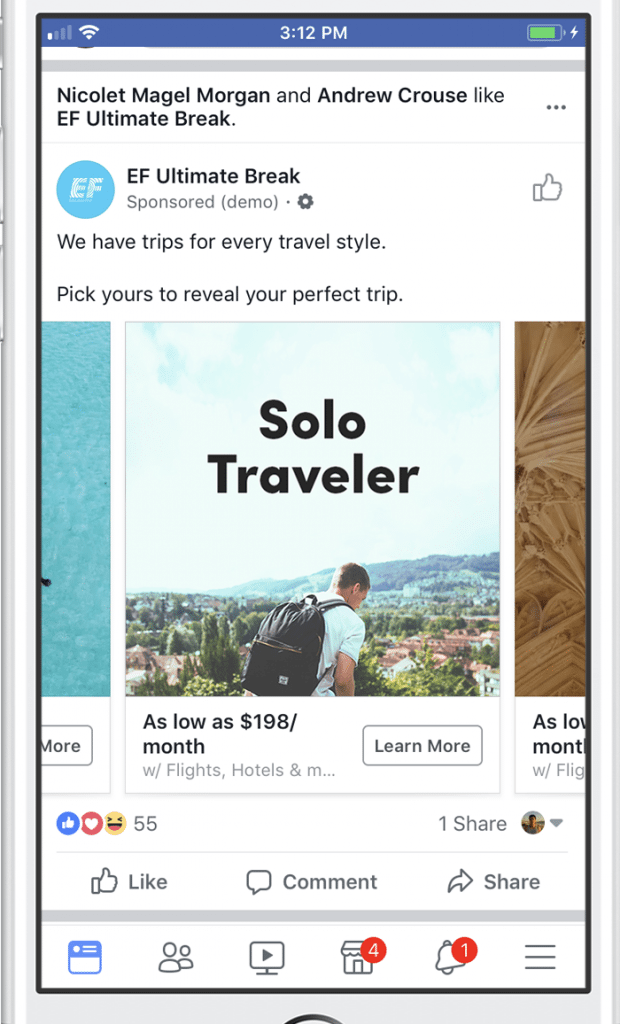Facebook Takes on Google With Trip-Planning Ads

Skift Take
Companies such as Google and TripAdvisor have been helping travelers decide where to travel for years, and Facebook now wants a bigger slice of that pie.
That's why Facebook is launching a new ad product this week to help travelers pick where they want to vacation.
The new product, trip consideration, is meant to reach people who have shown they want to travel, such as liking a company's Facebook page, but haven't decided on a destination. Many travelers get trip ideas from Facebook and Instagram as they see photos and posts from friends and families' vacations in their newsfeeds.
Trip consideration is available on Facebook, Instagram, and Facebook's Audience Network and is not part of dynamic ads for travel which launched in May 2016, said Christine Warner, head of travel for Facebook. "This is a separate solution you can use earlier on before you show travelers a dynamic ad," Warner said. "Selecting a destination often comes after someone shows travel intent. After you show them a trip consideration ad, then a brand could potentially retarget travelers with a dynamic ad."
NYC & Company, the tourism board for New York City, was part of the test pilot for trip consideration. Trip consideration has been the tourism board's best-performing strategy element so far on Facebook, Jason Berman, managing director of brand marketing for NYC & Company, said in a statement.
The tourism board tested trip consideration on its "True York City" campaign that debuted last year, and the product helped the campaign get 61 percent more video views and 58 percent more link clicks.
Warner said many travelers are spending five times more time on Facebook and Instagram than any other trip-planning site. Roughly half 50 of travelers use a mobile device first when planning a trip, and they visit 56 travel-related searches over 43 days before booking.
Colleen Coulter, industry manager for travel and global marketing solutions at Facebook, said travelers have used more than 250 million hashtags for travel on Instagram. "People rely on it as a discovery engine," she said. "We want to ensure that we're also helping to create a community of travelers given activity they are displaying across the channels. And we're helping advertisers capitalize on that."
Evolution of Facebook Travel Ads
The travel industry was one of the first industries with which Facebook launched dynamic ads a year and a half ago. Many travelers have likely seen these ads that feature compelling photos and videos. The content often looks more like a marketing campaign that seems natural in their newsfeeds rather than an intrusive advertisement.
Warner said she expects many brands that have used dynamic ads will experiment with and adopt trip consideration as the two complement each other.
But dynamic travel ad adoption has been steady but not overwhelming, said Nicholas Ward, president and co-founder of Koddi, a Fort Worth, Texas-based company that helps travel advertisers drive revenue through Facebook and metasearch. Koddi is also a Facebook marketing partner helping with trip consideration.
Ward said he has noticed hotels like IHG and booking sites have been the two largest travel sectors for dynamic ads. "I think advertisers are pretty aware of these ads, but not using them most effectively yet," said Ward. "It just takes a little bit of time to make sure you have the right assets to show to users. There’s a requirement for certain changes that need to be made to your website to run dynamic ads. Those things are small barriers to entry."
Facebook Ads Have Paid Off
Ward said Facebook tends to know when a traveler has looked at specific hotels and destinations. "Programs like dynamic ads for travel have been very effective low in the funnel," he said. "Users engage with them frequently. As a travel advertiser, I can respond to when a user searches for a specific hotel."
Video ads, in particular, have been effective with dynamic ads, said Ward. "That ecosystem is starting to build up and video ads perform significantly better and are significantly more engaging," he said.
The New Orleans Tourism Marketing Corporation ran Facebook carousels and video ads on mobile last year that it said were effective. New Orleans' ads reached 17.4 million people on Facebook and Instagram and led to an 8-point increase in intent to visit the destination. About three-fourths of people who viewed the video ads watched the entire videos.
Jeremy Cooker, vice president of marketing and special projects at the New Orleans Tourism Marketing Corporation, said Facebook ads are a critical part of its digital advertising. "They're essential because of the ability to target and then track how people interact with us and our brand throughout the customer journey," he said.
"We absolutely plan to do more with Facebook," Cooker said. "We’re looking at doing both carousel and dynamic ads and incorporating more video into both because it performs so well."
Coulter said ads that are created specifically for mobile, like in New Orleans' case, usually are most effective. "With New Orleans, this wasn't them taking creative from TV and trying to tweak it," she said. "They started with mobile in mind and built specifically for mobile. We work with partners to optimize existing assets for mobile but we see success when they start with mobile form the beginning."
Visit Florida, a major destination that markets the most visited U.S. state, has also been running Facebook carousel ads.
The destination hasn't used dynamic ads, said Stephen Lawson, vice president of government relations for Visit Florida. "This placement requires a product catalog or product feed and we do not currently use either for our social media campaigns."
Trip Consideration Competitors
When asked about how Facebook views its new trip-planning ad product in the context of others that other companies like Google have had for years, Warner didn't mention any companies by name but said Facebook wants to be where people are spending most of their time. "We always want to add value to the end user," she said.
But there's no question Facebook is feeling pressure from competitors, and trip consideration is an indication of the long-term value the company sees in travel.
Facebook has changed its newsfeed algorithm many times to favor certain kinds of posts or advertising, often to the detriment of many users and brands. Warner said Facebook is focused on business results for travel and other industries and that the paid side will drive more results than organic. "Given how much content is on the platform, organic just doesn't show up as much as paid content," she said.
But Ward said in an already competitive trip-planning ad ecosystem, trip consideration stands out. "Trip consideration is different because Facebook is pulling proprietary signals," he said. "Maybe a traveler hasn’t searched for a destination yet and they’re thinking 'maybe I should travel.' This is pretty unique in the space because in most other places the user has to express specific intent."
Because Facebook uses proprietary signals, trip consideration's overlap with Google is smaller than with their other projects," said Ward. "Dynamic ads overlap pretty heavily with Google, but not with trip consideration. This fills a gap in the space. It's not so much of a chip at Google, more than it's an incremental product. A Google user pretty much has to say I’m looking for a hotel in Dallas. With trip consideration, the user doesn’t have to tell Facebook anything."
"Facebook is a smaller channel for us today compared to other advertising," said Ward. "But Facebook is still very compelling to reach travelers during multiple stages of the funnel. I see Facebook as the next big disruption in travel advertising."
Many travelers appreciate relevant ads but are also wary of how their information was used to serve them those ads. As Facebook wants to become more relevant to travelers, it also needs to give them more control and transparency on what information they allow to be shared.
"If you’re just going to put something creepy in front of the user, that tends not to have high engagement anyway, and doesn’t end up paying off," said Ward. "We need to give unique helpful experiences. If user signals indicate this is good content, Facebook rewards that."
Warner said travelers demand personalization and will find trip inspiration ads helpful. "Over 67 percent of users we've surveyed wanted to have communications personalized to them," she said. "When ads look like everything else you have in your feed that's a good thing, and we’re actually making advertising more relevant."




